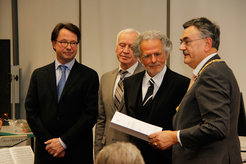Prof. Walter Zieglgänsberger has been awarded an honorary doctorate by the TUM
Nowadays, the technical term „pain memory“ is well-known, not only among scientists and physicians but also among ordinary persons. Walter Zieglgänsberger has coined this expression with his scientific work concerning the causes and the chronification of painful conditions. For his outstanding achievements in the field of pain research, the TUM (Technische Universität München) awarded Prof. Walter Zieglgänsberger an honorary doctorate.

It is not least thanks to the research of Walter Zieglgänsberger that we nowadays understand how pain arises and know that long-lasting pain may have serious consequences, namely the formation of a pain memory in the brain. It should be noted in this context that his scientific way wasn't always easy, as Prof. Eberhard Kochs, Director of the Clinic for Anaesthesiology, emphasized in his honorific speech: „... as a very young scientist, you performed experiments on spinal cord neurons. You discovered that these cells, by adding glutamate, can be induced to amplify pain signals. At that time, this was not at all scientific consensus. Then, it was assumed that the worse the injury, the greater the pain. Although renowned scientists railed at your approach, you unflinchingly continued your way which led to fundamental scientific findings in the field of pain research...“
For the physician and researcher Walter Zieglgänsberger, the transfer of new scientific findings into clinical practice, however, was a matter particularly close to his heart. With great commitment, he devoted himself to the development of pain treatment and early clinical use of pain medication in order to successfully prevent the formation of a pain memory.
In a ceremonial act, the honorary doctorate was bestowed upon Prof. Zieglgänsberger by Prof. Wolfgang Herrmann, President of the TUM, on March 2nd, 2012. This special award is only given to very few personalities.
Prof. Dr. Walter Zieglgänsberger studied human medicine in Munich from 1961-1967. In his PhD thesis about Dopaminergic Transmission Mechanisms in the Extrapyramidal System, he dedicated himself to the analysis of the interneuronal communication in the brain of vertebrates. After having received his licence to practise medicine, he more and more turned to neurobiological basic research at the Max Planck Institute of Psychiatry in Munich since 1971. After his habilitation in physiology and pharmacology in 1976, he did research at the AVD Center for Behavioral Neuroscience in La Jolla, California, for two years. Back in Munich again, he was appointed Adjunct Professor at the Ludwig Maximilians University there. From 1984 to 2009, Prof. Zieglgänsberger led the research group “Clinical Neuropharmacology” at the Max Planck Institute of Psychiatry.
To the most important fields of his work belonged molecular biological, electrophysiological and pharmacological aspects of neurohumoral transmission mechanisms in the central nervous system. Special consideration was given to pain research and addiction research.
BM
